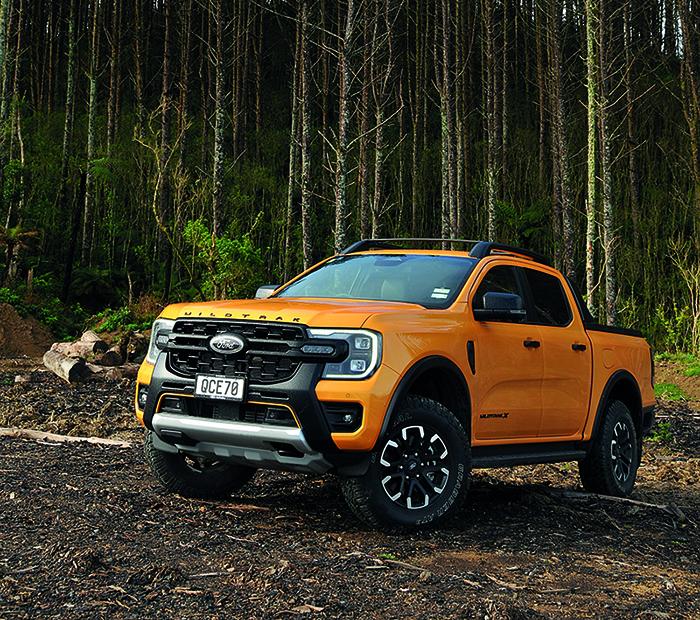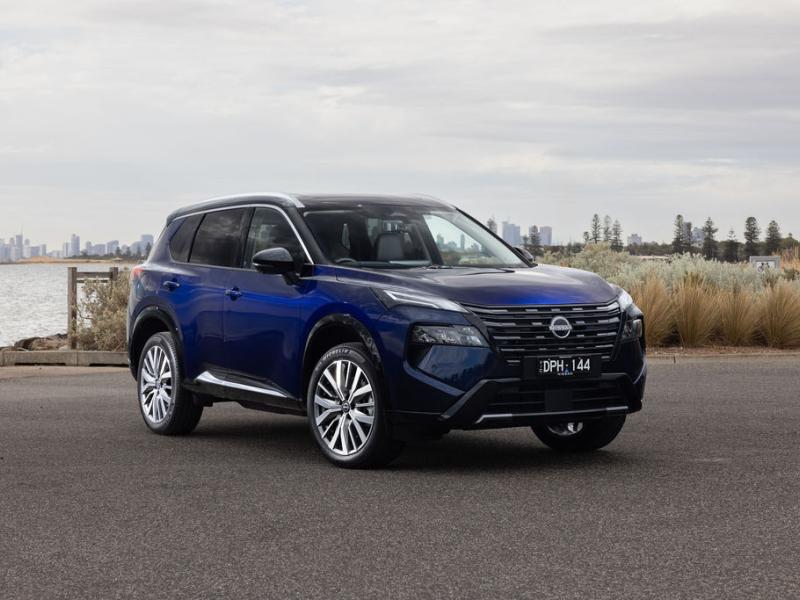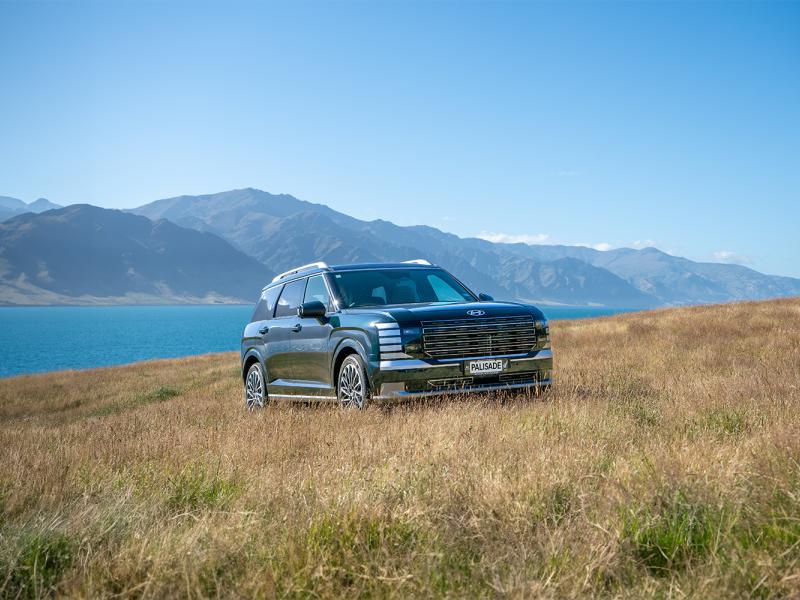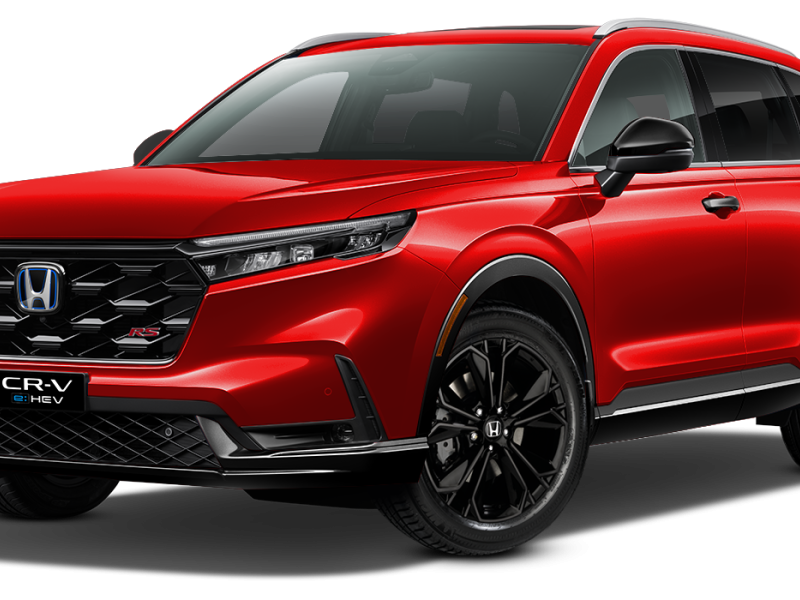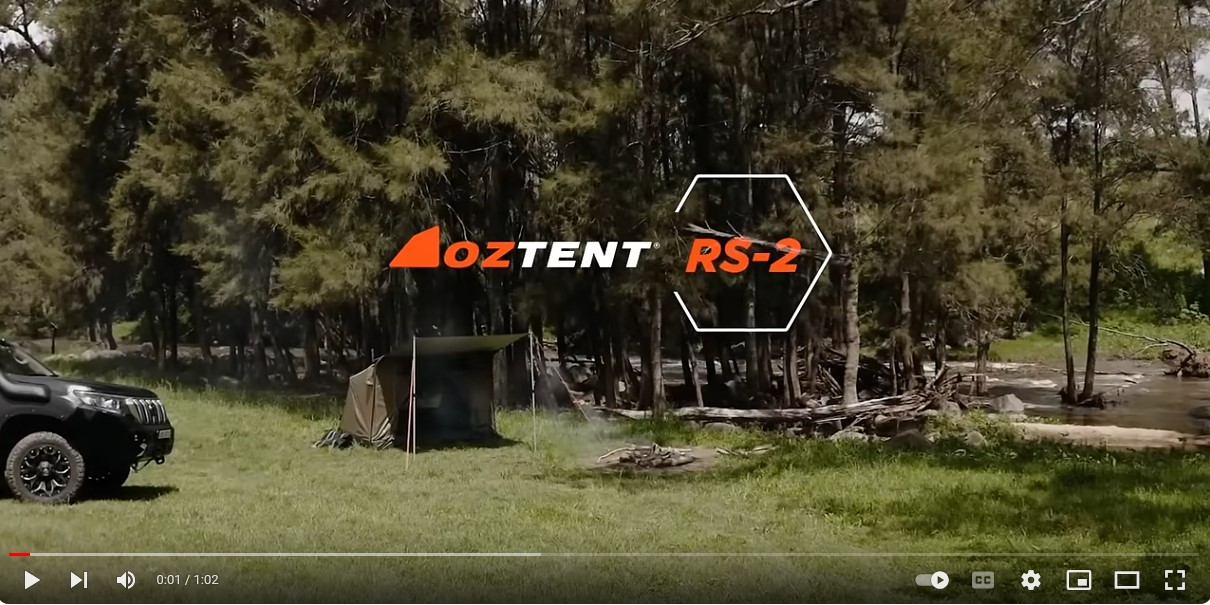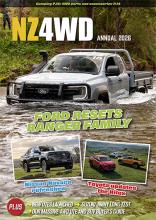There’s a lot to talk about here.
Beyond the outstanding success of Ford’s ‘next-Gen’ range of Rangers, the Wildtrak X blends street smarts with undeniable off-road ability.
Ranger Wildtrak X can be seen as a step between the popular Wildtrak and hardcore Raptor variants – combining bi-turbo four-cylinder power with full-time four-wheel drive.
It scores a unique suspension spec that features position-sensitive Bilstein dampers with external reservoirs, new springs and a first-time drive on new General Grabber AT tyres.
The engine is Ford’s familiar bi-turbo 2.0-litre four-cylinder diesel, making 154kW and 500Nm of torque. The engine is mildly refined over the version it replaces, and certainly quieter. Its stand-out is that mountain of torque. This is not the most torque available in a Ranger or Everest – that honour goes to the 600Nm V6 versions – but it’s plenty to deal with the truck’s maximum tow rating of 3,500kg (braked).
Fuel economy: Ford says the Wildtrak X will consume 8.3 litres of diesel for every 100km travelled, slightly more than the Wildtrak. A two-day mixed-use test returned an average fuel consumption of 11.0/100km over 400km of driving.
Conditions ranged from windy and cold to punishing squalls of horizontal rain hammering inland from the west coast, and the challenging road and track conditions up the Klondyke will have played a part in our fuel economy result.
The ‘X’ also features the best version of the Ranger’s transmission/driveline: ten speed automatic, electronic drive modes including our favourite mud/ruts setting, and a transfer case that includes the very good torque-apportioning 4-A mode along with 2-hi, 4-hi and 4-lo. Oh, and a lockable rear diff.
The changes together deliver a class-leading ride and provide increased ground clearance. This means the most visually appealing, urban standout Ranger is also the most off-road-friendly.
Inside, there’s an ebony interior, soft-touch Terra Suede wrap and Cyber Orange and Precision Grey accents along with embroidered Miko suede and leather accented seats. There are embroidered Wildtrak X logos on the dash and both front seats.
Both driver and front passenger seats have eight-way power adjustment. The Wildtrak’s 8.0-inch driver’s instrument cluster has been upgraded to the 12.3-inch system from the Raptor and Platinum, and all three share Ford’s tablet-style 12-inch infotainment touchscreen, which has a few more screens and functions specifically for off-roading.
Like the Wildtrak, the Wildtrak X has wireless Android Auto and Apple CarPlay.
The Bluetooth phone connectivity is also among the easiest link-in functions on the market.
There’s a large bin under the leather-covered centre armrest and two cupholders in the centre console next to the transmission shifter. The Wildtrak X has dual-zone climate control, a B&O sound system, and a phone charging pad.
The back seat is a more sombre affair with very little changed from the Wildtrak beyond embroidered floor mats. Back-seat passengers get air vents, seat-back pockets and USB charging ports. Cupholders hide in the hard-to-open centre armrest and there are bottle holders in the doors.
There’s technology to match the ‘luxe’ too. Wildtrak X features a larger 12.4-inch digital instrument cluster with a fully configurable layout along with a ‘coast-to-coast’ dash featuring a 12-inch centre multi-function touchscreen and B&O premium audio system. Our favourite dash display is the default, which runs water temperature, oil temperature and transmission temperature graphic ‘gauges’ along the top, a digital tacho and digital speed readout as the large gauge displays. There are also incline and side-hill displays.
There’s a wireless charging pad for those with suitable phones. That’s useful, keeps wiring clutter to a minimum.
Outside, our Cyber Orange test vehicle has a distinctive road (and off-road) presence. Up front, there’s the signature Wildtrak grille and ‘off-road cut’ panelwork that is designed with off-road driving in mind. Wildtrak X includes matrix C-Clamp LED headlamps with auxiliary LED grille lamps and a steel bash plate.
The ‘X’ also gets a Wildtrak branding across the bonnet (Aussie versions apparently just get ‘Ranger’) and Wildtrak X decals on each front door.
The 17-inch aluminium alloy wheels are gloss black with highly polished accents. As already mentioned, the wheels wear General Grabber all-terrain tyres in a 265/70 size, which are quiet and civilised on tarmac but clawed their way through loose, tight and tricky sections up on Klondyke Road in the northern Waikato.
Wildtrak’s cast aluminium side steps are robust enough to do the job but tuck in enough that they don’t catch on rocks or brush.
Around to the rear, and the Wildtrak has the same excellent wellside step for sorting out cargo as the rest of the range.
Behind the cab, the sail-plane wellside bar (Flexible Rack System) is one of those clever sliding designs that will move backward to support long loads like timber or surfcasting rods. It even works when the roll-top wellside cover is open or closed. The FRS has a maximum load limit of 80kg (dynamic) and 250kg (static). That suggests thought has been given to fitting one of the increasing range of rooftop tents available in New Zealand these days.
Removal of the radio antenna mast on the cab rear is recommended when cargo is positioned over the antenna – which may affect availability of radio, satellite and connected services.
The tub itself gets the Wildtrak’s drop-in bedliner, cargo rails, various tie-down points, a couple of bed lights and a 12V power socket. The Wildtrak’s standard powered roller cover and the easy-lift tailgate are keyed into the central locking.
Safety: The whole Ford Ranger dual-cab ute range was crash-tested by independent safety organisation ANCAP in 2022 and awarded five stars. The Wildtrak X has dual front and front-side airbags, curtain airbags (for both rows of seating), a front centre airbag, and a driver’s knee airbag.
The Ford Ranger Wildtrak X has everything the Wildtrak gets in terms of driver-assist safety systems. These features include autonomous emergency braking with cyclist, pedestrian and intersection intervention, plus adaptive cruise control and speed sign recognition that are linked so the cruise or the speed limiter aligns with the current speed zone.
Reversing out of our driveway, the truck’s rear collision proximity alert is a real help, warning of traffic approaching from either direction.
The Ranger Wildtrak X has blind-spot monitoring, lane-departure warning, tyre pressure monitoring, a 360-degree camera (handy off-road), and even a trailer-light test function so you can get out and check trailer lighting solo. The lane assist is as discreet as it should be, giving the wheel a nudge if it detects lane crossing without the indicator being used.
The drive: in the grip of a bleak storm, we went southwest into the Waikato to one of our favourite roads near Port Waikato.
Klondyke Road is where the test started, and it’s an epic dirt drive on a nice – or nasty – day.
We headed quickly uphill, the road clinging to the side of a steep hill system. The surface went from firm dirt to gravel and clay, then back again. It was a good chance to see the Bilstein shock absorbers at their rough-road best. The shocks make a small improvement in on-road manners, most noticeable in the reduced frontal body roll in corners, but also in their ability to manage rougher tarmac road surfaces. Off-road, the shocks and springs do a great job of maximising tyre contact under tough conditions and are aided by a decent amount of wheel articulation.
The X’s capabilities will definitely keep the weekend warrior happy. We threw the Wildtrak X at Klondykes’s storm-damaged extremes and detoured down a couple of chewed-out logging tracks and it easily met our expectations.
Most impressively, we ran up to – and through – a big undercut road slump in rear wheel drive. The remainder of the road surface wasn’t Ranger-width, so the driver’s side wheels were directed 400mm up on the bank and away we went.
The truck just chewed its way on through, no complaint. That torque just needs to be managed as traction reduces. Gently does it.
After we were clear, we did stop and drop it into 4-A for the rest of the trip.
The logging tracks and skid clearings were never a worry. Using 4-A tightens the truck right down even in the soft churned slop of the clearings.
The remaining sections of storm-damaged road were dealt with by a brief slow-down to pick a line, taking a moment to eye the other side for a way clear of the mess.
Our test truck, QCE70, had already survived a global media launch event in the South Island. Despite the best/worst efforts of the overseas media, there were few signs of the abuse it endured. It drove like new. We did find some southern loam in a couple of places on the chassis though.
For those who plan to go off-road semi-regularly for work or fun, the Ranger Wildtrak X is one of the best options in an increasingly crowded and high-tech market.
Its showroom-ready combination of occupant comfort and capability is unmatched by any other brand for the price. More to the point, it arrives equipped with a whole lot of equipment for off-roading fun.
It’s an easy ute to live with on weekdays, and on weekends it will go further off-road than any similarly priced and equipped.


